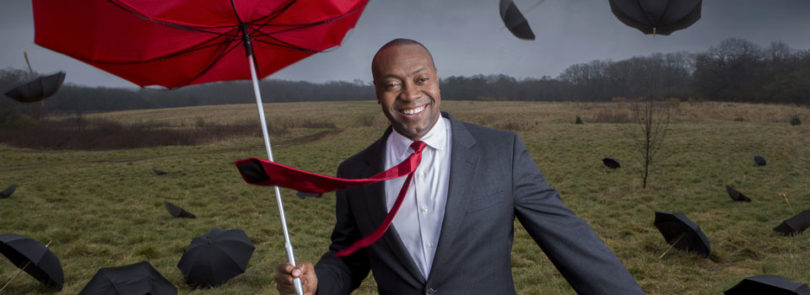Marshall Shepherd has a deep and abiding fear of zombies. You wouldn’t think a climate scientist has much opportunity to rub shoulders with the undead, but he runs into the shuffling ghouls more often than he would like, and he’s devoted a lot of time and energy to their eradication. They’re everywhere. He’s seen them in his local grocery store, and he’s fought them in his classroom. They have a nasty tendency to crash his public talks, and he’s even sparred with them on live TV.
The bogeymen he faces aren’t humanoid, however, but the misinformation he calls “zombie theories” — the litany of benighted arguments that human activities are not, after all, the root cause of global climate change. Time and time again, atmospheric scientists have countered these assertions — such as “The climate change we are now witnessing is natural,” “It’s not humans, it’s the sun,” and “The alarmist scientists just want grant money” — but in full zombie tradition, the theories simply will not die, at least not yet. Shepherd’s firm belief is that truth ultimately will prevail, so he fights the zombie theories, using the best weapons at his disposal: scientific evidence and public outreach.
Shepherd had watched for years as the public debate surrounding climate change devolved into what he saw as bloody stalemates between two talking heads, where thoughtful analysis and scientific evidence took a back seat to conjecture and wild speculation.
“Why is there so much popular debate when the vast majority of climate scientists and most of the leading scientific organizations worldwide agree that warming trends of the past century are likely, in part, due to human activities?” he asked.
While certainly a number of factors were contributing to misguided public opinion, Shepherd decided that a big part of the problem was communication — not enough of it, that is, by bona fide climate scientists.
 (At left, Shepherd takes wind readings from the roof of the geography building. Photo by Nancy Evelyn)
(At left, Shepherd takes wind readings from the roof of the geography building. Photo by Nancy Evelyn)
Shepherd certainly qualifies as one of them. The Athletic Association Distinguished Professor at the University of Georgia and director of its Atmospheric Sciences Program, he spent 12 years as a research meteorologist in the Earth-Sun Division of NASA’s Goddard Space Flight Center and served as president of the American Meteorological Society. He also received the Presidential Early Career Award from George W. Bush in 2004 for his pioneering scientific research.
Old-guard academics customarily find public outreach both daunting and distasteful; in their minds, it reeks of shameless self-promotion or sensationalism, Shepherd said. But something has to give as climate change continues unabated, together with the risks of rising ocean levels, water shortages, national security threats, declining agricultural productivity, and economic harm. So Shepherd has made it his business to set the public record straight.
“I believe that the academic model of teaching classes, publishing our papers, going to conferences, and coming back to our offices to do the same cloistered thing all over again is an outdated concept,” Shepherd said. “The issues that UGA scientists are dealing with affect Georgia, our nation, the whole world. I have expertise that has direct impact on people’s lives, so I felt the need to get the message out in order to inform the conversations about climate change”
And out he went. Shepherd embarked on a zombie-slaying mission that has taken him to places where many scientists fear to tread. He is a frequent guest on a number of national and international news shows; he meets with community organizations to present the latest scientific findings to lay audiences; he briefs Congress and the White House; he writes guest columns; he uses Twitter; and he even hosts his own weekly show on The Weather Channel called WX Geeks, where scientists discuss weather, climate, and new technology.
Speaking a new language
It’s easy for the professional scientist to decry the lack of scientific literacy among the general population; life would be so much easier if everyone knew how to assess geophysical fluid dynamics or radiative equilibria at home. But Shepherd’s bold step into the public sphere has forced him to think of new ways to talk about climate and weather.
“This is complicated science, so why should I expect an investment banker or pastry chef to understand all the issues? After all, I don’t know anything about what they do for a living,” he said.
Shepherd began experimenting with new ways of presenting scientific observations that remain faithful to the data but also convey information in an easy-to-understand format. One of his go-to metaphors is a response to the oft-stated zombie theory that we could not experience persistently bone-chilling temperatures — as in the winter just past — if the planet were warming.
“People tell me all the time that there’s no such thing as global warming because it’s cold outside,” he said. “So I tell them to think of it this way: weather is like your mood and climate is like your personality. Your mood shifts from day to day, just like our weather. But climate is the big picture; it’s what’s happening in the long term.”
Even as a frequent guest on TV news shows, Shepherd has a real problem with the way climate debates are orchestrated. “It’s a point/counterpoint kind of format with a scientist on one side and a climate-change skeptic on the other,” he said. “That’s a false equivalency. It would be like going into Sanford Stadium during a UGA football game, plucking out one Georgia fan and one Tennessee fan, and telling everyone that the support for both sides is equal. It’s just not an accurate portrayal.”
Just the facts
Perhaps his favorite zombie theory is that scientists are only pushing climate change because they want more grant money. Shepherd likes to quote the great American author Upton Sinclair, who famously said, “It is difficult to get a man to understand something when his salary depends upon his not understanding it.” So how can we trust scientists when so much of their career success depends on the grants that support their research agendas?
 “I love this one, because the reality is that I could get far more grant money than I have now if I had evidence that our climate models and observations were flawed,” Shepherd said. “It would shake the very foundations of the science community, and I’d probably win awards for it. But I don’t have any evidence that we’re wrong.”
“I love this one, because the reality is that I could get far more grant money than I have now if I had evidence that our climate models and observations were flawed,” Shepherd said. “It would shake the very foundations of the science community, and I’d probably win awards for it. But I don’t have any evidence that we’re wrong.”
Like any good scientist worth his salt, Shepherd is an “equal opportunity” zombie slayer-a refuter of fantasies, whether they come from climate-change skeptics or quarters closer to home. For example, in their zeal to raise awareness and secure early action, some may point to the devastation wrought by a single storm, drought, or heat wave and imply it was due to global warming emissions from human activities.
But science doesn’t work that way, Shepherd said. “I can’t point to a single event and say that it was caused by climate change,” he said. “This is where I’ve found another useful analogy. Think of bad storms like home runs in baseball’s recent steroid era. Sure, the big hitters have always hit home runs, and I can’t say that any one homer resulted from steroid use. However, I can make the argument that steroids made a lot more balls go over the fence than normal.”
“Climate change is no different. You have to have multiple data points to make a solid argument, and I think that we will probably see more violent storms because of rising global temperatures. But it’s disingenuous to suggest that one storm is the result of climate change.”
The long road ahead
Shepherd insists that his zombie slaying is no publicity stunt. While he has found some success as a public champion of science, his first and foremost job will always be as a researcher and educator.
“When I speak somewhere, people will sometimes introduce me as the host of Wx Geeks, and I always correct them,” he said. “I am a professor at the University of Georgia, and my students always get first priority. I don’t want to be known as a TV show host.”
But he hopes that his foray into the public sphere will serve as a catalyst for more honest, evidence-based discussions about the issues we face as a global community. And he is optimistic. Yes, climate change is a serious problem, but it is not insurmountable, he said. Humans have a lot of hard decisions to make, and Shepherd is fully prepared to share his knowledge so that the public can better distinguish between fact and fancy.
“I want to show that it’s possible to be both a productive scientist and a good communicator,” he said. “I really like what I’m able to do right now. I’ve established myself professionally, earned the respect of my peers, and it’s a wonderful thing to be able to share knowledge with new groups of people.”
— James Hataway, Office of the Vice President for Research, from the Spring 2015 issue of ugaresearch magazine. Photo by Nancy Evelyn/UGA.







